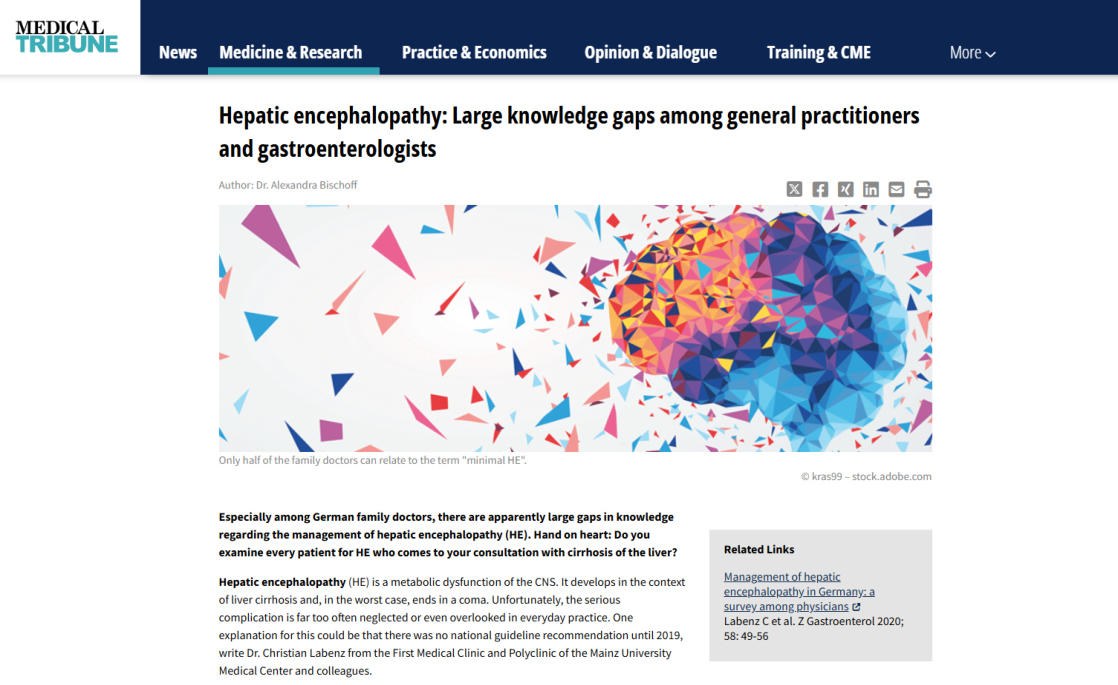
Diagnosis of Hepatic Encephalopathy


Diagnosis
Back in 2019 an article appeared in a German publication called the “Medical Tribune”. The article was entitled, “Hepatic Encephalopathy: major knowledge gaps among general
practitioners and Gastroenterologists”:
https://www.medical-tribune.de/medizin-und-forschung/artikel/hepatische-enzephalopathie-grosse-wissensluecken-bei-hausaerzten-und-gastroenterologen
This article starts by asking the following question:
“There are apparently large gaps in knowledge, especially among German general practitioners, as far as the management of hepatic encephalopathy (HE) is concerned. Be honest: Do you
examine every patient who comes to your office with cirrhosis of the liver for HE? Hepatic encephalopathy (HE) is a metabolic disorder of the central nervous system. It develops as part of
cirrhosis of the liver and, in the worst case, ends in a coma. Unfortunately, this serious complication is all too often neglected or even overlooked in everyday practice. One explanation for
this could be that there was no national guidelines recommendation as of 2019.”
This question should be asked to GPs in the UK too. I suffered terribly with HE and was prescribed Lactalose, and left to get on with it. There is so much more that can be and
should be done. Firstly there are several ways of assessing if a person has HE.
Over on page 2 (The HE Mindset & Behaviour), at the end of the video featuring both Charlie and his wife Angie. They talk about the lack of understanding and support from his
local doctor when Charlie was diagnosed with having HE.
This can be such an important time, as the whole family are often affected. GPs need to explain in more detail what is going on. A Wife/Husband/Partner/Spouse/Carer should be
present at this meeting, as they also need to know and understand that this is a mental health condition, for which the patient has no control.
I have known cases where a wife who didn’t fully understand what was happening, simply turned round and said, “You’ve changed, I never signed up for this, I’m off”. I have known
of families having to separate as the HE behaviour became too unpredictable. One poor Mother fearing for her daughter's physical and mental safety, had to separate. If children
are in the household, then they don’t understand why their Mommy or Daddy are saying nasty things, and end up blaming themselves. GPs need to understand more about what
is actually happening with HE and be able to explain that this is a mental health condition, over which the patient has little or no control. Once they understand, the family unit
will become more supportive. After all, it’s no one’s fault.
The animal naming test is a quick and easy method to detect cognitive disorders that appear in the early stages of hepatic encephalopathy ( HE ). Patients are asked to name as
many different animals as possible within 60 seconds. "If you can only do 'dog, cat, horse and cow', that's rather unfavorable." In a study with 327 cirrhosis patients, colleagues
tested the test with regard to its diagnostic applicability and then validated it in a healthy control cohort. With a critical threshold of 15 animal names , the test proved to be an
accurate method to distinguish cognitively unimpaired patients from those with minimal HE.
A three-level score (0 for ≥ 15 animals, 1 for 10-14 animals and 2 for ≤ 9 animals) correlated very well with the psychometric score and the EEG findings. In addition, it was possible
to estimate the one-year risk for the development of HE.
There is another type of Animal Name Test, which is a form of STROOP test. The Stroop test can be used to measure a person’s selective attention capacity and skills, processing
speed, and alongside other tests to evaluate overall executive processing abilities. I can’t find any examples of the Animal Name Stroop Test, but here is a coloured numbered
version. Here you have to name the colour and not say what the word says. It’s harder than you may think.
The West Haven score is a series of observations which a doctor should use to assess the serverity of a patients condition. There are some guidelines laid down by
NICE, (NATIONAL INSTITUTE FOR HEALTH AND CLINICAL EXCELLENCE) governing this Conn score classification:
https://www.nice.org.uk/guidance/ta337/documents/hepatic-encephalopathy-maintenance-treatment-rifaximin-draft-scope-for-consultation2
Asterixis
Some forms of liver diseases seem linked to Asterixis, it’s sometimes called “liver flap” as well. The flapping is said to resemble a bird’s wings in flight. One way Doctors and GPs may test for asterixis is by asking people to stretch out their arms and extend (not flex) their wrists. Repetitive flapping forward may ensue to signify asterixis.The West Haven Score
The Animal Name Test (or Stroop Test)
The Ammonia Blood Test (NH3)
The Ammonia blood test is often used to establish if there is excessive ammonia in the blood system. This test needs to be carried out in a hospital environment as it needs to be
analysed straight away. However, this blood test can also highlight other causes. This blood test can be used to check for:
Hepatic encephalopathy
:
This condition happens when toxins (poisons), including ammonia, build up in your brain because your liver is unable to break them down. It can cause
memory loss, confusion, loss of consciousness, and coma.
Reye syndrome
:
This rare disease damages the brain and liver. Without treatment, it causes death. It mostly happens in children younger than 15 who have had a
viral infection
that causes a
fever
, such as
chickenpox
or the
flu
. Taking aspirin during a viral illness may increase the risk of Reye syndrome.
Urea cycle disorders: (UCDs). This is a group of rare genetic conditions that you inherit from your parents. If you have a UCD, you lack enzymes that help change ammonia into
urea
Care needs to be taken with this blood test as
the most common cause of high ammonia levels is artefactual effects, due to delay in processing the sample or from poor sample
collection.





























